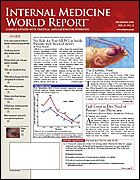Telbivudine Provides Rapid Suppression of Hepatitis B
From the American Association for the Study of Liver Diseases
BOSTON?Physicians who are trying to achieve undetectable viral levels in patients infected with hepatitis B virus (HBV) may have greater success with the recently approved agent telbivudine (Tyzeka), according to data presented at the American Association for the Study of Liver Diseases annual meeting.
Telbivudine is indicated for the treatment of chronic HBV infection in adults with evidence of viral replication and persistent elevations in serum aminotransferase levels or histologically active disease. The recommended starting dose is 600 mg/day, with or without food.
In a randomized double-blind trial known as GLOBE that involved 1367 patients aged ≥16 years with chronic HBV infection, telbivudine therapy resulted in better viral clearance during the first 6 months of therapy, as well as better outcomes after 1 and 2 years of treatment, compared with lamivudine (Epivir) therapy.
The GLOBE trial, which compared telbivudine (600 mg/d) with lamivudine (100 mg/d), also showed that in hepatitis B e-antigen (HBeAg)-negative patients, 82% of those treated with telbivudine achieved undetectable virus levels compared with only 57% of those treated with lamivudine. In HBeAg-positive patients, 56% in the telbivudine group and 39% in the lamivudine group achieved viral clearance.
"In chronic disease that often requires long-term treatment, it is important to know how patients may respond over time," said coinvestigator Adrian M. Di Bisceglie, MD, chief of hepatology, St. Louis University, and codirector of the Saint Louis University Liver Center. "As a robust 2-year analysis of hepatitis B treatment, the GLOBE results provide further evidence that the 24-week antiviral response is associated with improved clinical outcomes at 2 years."
IMWR
Dr Di Bisceglie told , "One of the distinguishing features with telbivudine is the rapidity with which the levels of hepatitis B virus DNA go down once the patient starts treatment, certainly more rapidly than occurs with adefovir [Hepsera] and with lamivudine. The other important point is that now that we have 4 drugs to treat hepatitis B?this is just another significant addition to the treatment options that we have available for hepatitis B. We're treating more patients for longer periods of time, and therefore the more drug options that we have available the better."
The 1-year primary efficacy end point was a combination of viral suppression and either improved liver disease markers or loss of detectable HBeAg. The response rate was 75% in the HBeAg-positive patients treated with telbivudine and 67% in those treated with lamivudine. For HBeAg-negative patients, the respective rates were 75% and 77%.
At 2 years, response rates in HBeAg-positive patients were 64% with telbivudine and 48% with lamivudine; in HBeAg-negative patients they were 78% and 66%, respectively.
Incidence of viral resistance was lower in patients who achieved polymerase chain reaction (PCR) negativity in the early stages of therapy. For telbivudine-treated patients who achieved PCR negativity at week 24, rates of resistance at 2 years were 4% in HBeAg-positive patients and 2% in HBeAg-negative patients.
Resistance was defined as a return of HBV DNA to >5 log10 or to within 1 log10 of baseline. In HBeAg-positive patients, 17.8% of patients receiving telbivudine and 30.1% of patients receiving lamivudine exhibited viral resistance at 2 years. In HBeAg-negative patients, the respective percentages were 7.3% and 16.6%.
Viral resistance?defined as rebound of HBV DNA after initial suppression to a 1-log10 increase above nadir?were 21.6% with telbivudine and 35% with lamivudine in the HBeAg-positive group and 8.6% and 21.9%, respectively, in the HBeAg-negative group.
Alanine aminotransferase flares occurred in 2.8% of patients treated with telbivudine and 8.4% of those treated with lamivudine. Grade 3/4 creatine kinase elevations occurred in 13% and 4% of the respective groups.
Other data were presented from a 1-year head-to-head trial that was designed to evaluate whether HBeAg-positive patients with chronic HBV who were previously treated with adefovir would benefit from switching to telbivudine instead of continuing with adefovir. This trial showed greater reductions in viral load in patients who received telbivudine for the full year, as well as in those who were switched to telbivudine after 24 weeks of adefovir treatment compared with those who received adefovir for the full year.
Some 135 adults with HBeAg-positive compensated chronic HBV were initially randomized (2:1) to adefovir 10 mg/day or telbivudine 600 mg/day for 24 weeks, with a secondary randomization (1:1) of adefovir recipients to continued adefovir therapy or to telbivudine at week 24.
The most common adverse events with telbivudine at 1 year in the GLOBE study were upper respiratory tract infection (14%), fatigue and malaise (12%), abdominal pain (12%), nasopharyngitis (11%), and increases in serum creatine phosphokinase concentration (9%).
"In a typical year an estimated 70,000 Americans will become infected with chronic hepatitis B virus, and some 5000 of them will die of the complications caused by the disease," said Steven Galson, MD, MPH, director of the FDA's Center for Drug Evaluation and Research. "Tyzeka offers prescribers another option for treating these patients."
Dr Di Bisceglie concluded, "It's been my experience that many primary care physicians have thought of hepatitis B as not being a treatable disease and therefore they have not paid much attention to it. They either haven't screened their patients, or if they're aware of somebody having hepatitis B they tended to say ?Well there's not much that can be done about it,' and moved on to some other problem. So these results, combined with some other recent advances in the treatment of hepatitis B, mean that hepatitis B is now a controllable disease. We have 4 drugs that work very well, we have a safe and effective vaccine?people should not be dying in this country any longer of hepatitis B. We need to find them, we need to treat them appropriately, and we need to vaccinate their families and contacts to make sure they are not infected."
